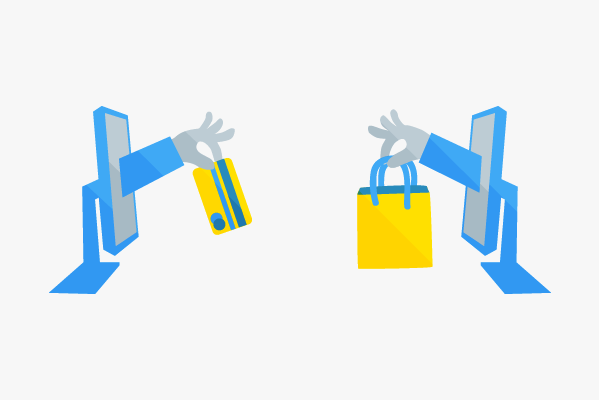E-Commerce
E-commerce or eCommerce is a complex concept and stands for electronic commerce. It is part of e-business and generally includes advertisement, buying and selling of goods and services on the Internet. The term has evolved into one of the core business models on the net. A typical example of e-commerce is online shopping.
Features
In order to manage business processes and relationships in a company, selected information and communication technologies for the electronic integration of value chains are used. The elimination of media breaks and organizational boundaries in the business processes are of particular interest. The traditional processes in a company include a variety of media breaks. The information is distributed by phone, by mail, per fax or in writing internally within the company, between two companies or between company and customers. An automated and electronic information exchange rarely happens. Typical of e-commerce is the electronic processing of business transactions and the targeted increase in efficiency of the business. Digital management of business relations is also a typical aspect of electronic commerce.
Pros and Cons
Pros
- The e-commerce purchase process can be completed without any delay.
- The potential customer can browse through online catalogs right at home, select the product they want, pay for it online and buy, so that the product is shipped promptly.
- A definite benefit for the company is the immediate proximity to the customer.
- Exchange of information between customer and service provider (by phone or email) is possible.
- E-Commerce speaks for the good performance of marketing activities and for an increasing professionalization of many companies (for example, store like Amazon).
- 24 hr service
- Fast response time in case of problems and discrepancies
- Low transaction costs
- Maximum comfort and the optimal fulfillment of customer needs
- High customer satisfaction
Cons
- No personal customer contact and personal communication between the customer and the company employees is non-existent.
- The information gathered in the pre-sales area, the phase of order processing and the phase of customer care in the after-sales area take place exclusively on the Internet.
Trends
For many companies which are mainly active in the online arena, e-commerce is characterized by an ideal, very well-developed business management system. Regarding the importance of e-commerce on the German market, a statement can only be made once the statistics are considered in more detail. According to a recent study by the EHI Retail Institute and Statista, which examines the e-commerce market in Germany, well-known shopping portals such as Amazon and Otto are among the top 5 German e-commerce companies. The study shows that Amazon is in first place with a turnover of 3.4 billion Euros. This is followed by Otto. The first top 100 companies are listed, with Zalando among the top 20. The study shows that the top ranking companies are also some of the most successful shopping portals in Germany.
Online / Offline Trade
Germans spend more and more money on the Internet. According to another study of November 2012, “The customer is king again,” the trend is as follows: Germans spend more and more money on the Internet mostly on books, music, movies and video games (nearly 70%), unlike the offline trade (or “shopping in a store”), where shoppers spend less money on books, music, movies and video games (only 20%). If you examine the offline shopping scene, Germans spend most of their money on food (71%). Online shoppers spend an average of 42% of their total expenditures on the Internet. In addition, it can be stated that those customers remain loyal online shoppers.

